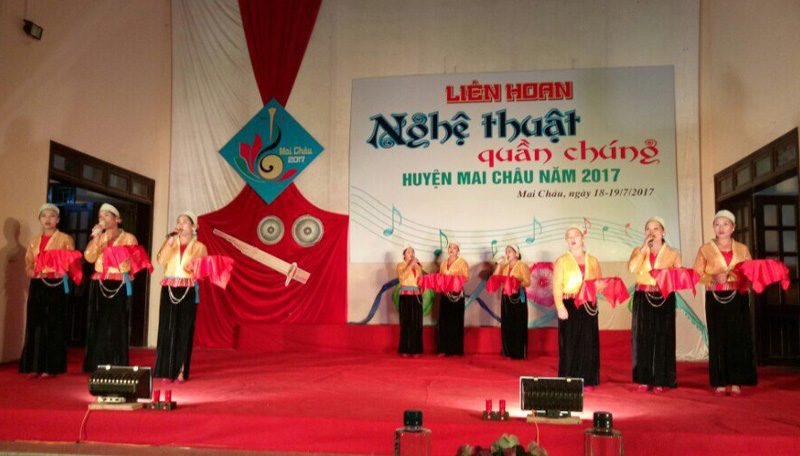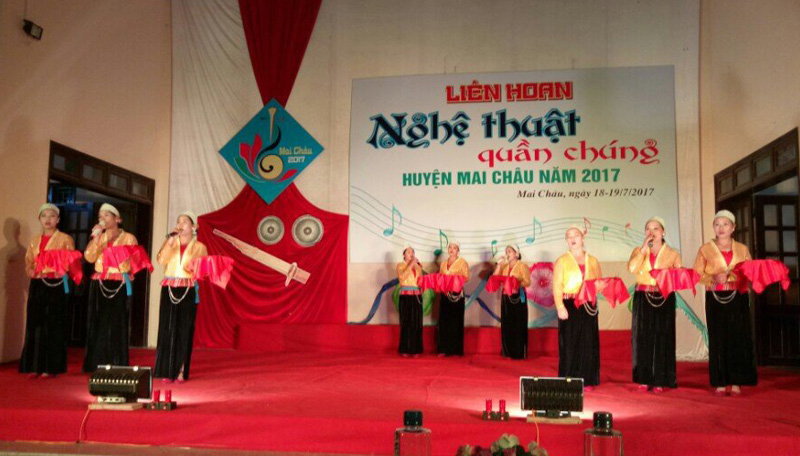
(HBO) – Visiting Mai Chau district on autumn days, visitors could enjoy music and dance performances everywhere in jubilant atmosphere.
The
district now has 183 art troupes, 138 of them were set up by the district
People’s Committee and receive an annual aid worth 2 million VND. In hamlets,
villages and community-based tourism areas in particular, 2-5 art troupes with
12-15 members regularly practise and perform. Ha Van Tuan, Director of the
district Centre of Culture and Sports said the district recently successfully
held a local art show 2017, attracting more than 340 artists from 21 troupes of
communes and townships. They made 60 performances of songs and dances extolling
the Party, Uncle Ho and soldiers, the tradition of heroic fighting by the Vietnamese
nation through generations, and patriotism. Most of performances were
thoroughly prepared and left deep impression on the audiences. Via art shows,
mass music performances have proved to increase in both quantity and
quality.
Photo caption: A performance at Mai Chau
district’s art show 2017
Apart from joining music performances as
requested by authorities, almost all art troupes work voluntarily and actively
popularise the Party’s policies and guidelines and State laws to the public.
Thanks to support of the Party units, local authorities and private resources,
art troupes equipped themselves with audio and light equipment, costumes, and
instruments and actively composed scripts, directed and set the scene for their
performances, which attracted many audiences. At present, grassroots art
troupes play a crucial role in maintaining, preserving and upholding folk songs
and dances, many of them draw elderly artists who still remember folk songs by
the Muong, Dao, Thai ethnic groups and pass them on to younger
generations.
Not only being held during the New Year
festival, local festivals are organised regularly, attracting numerous people
from young to old ones. From mass art troupes, the district Centre of Culture
and Sports chose outstanding artists and formed art troupes to join art shows
held by the province. At the provincial art show 2017 held in mid-August, Mai
Chau district’s art troupe brought to the stage excellent performances, which
were welcomed by audiences and won A prize./.
With an increasingly vibrant and widespread emulation movement aimed at building cultured residential areas and cultured families, Yen Thuy District has been making steady progress toward improving both the material and spiritual well-being of its people, while fostering a civilized, prosperous, beautiful, and progressive community.
Once lacking recreational spaces and community facilities, Residential Group 2 in Quynh Lam Ward (Hoa Binh City) has recently received attention for the construction of a new, spacious, and fully equipped cultural house. The project followed the model of state support combined with public contributions in both labor and funding.
The "All people unite to build cultural life" movement, which has been effectively integrated with Kim Boi district’s socio-economic development goals, is fostering a lively spirit of emulation across local residential areas, hamlets, villages, public agencies, and enterprises. In addition, through the initiative, traditional cultural values are being preserved and promoted, while community solidarity and mutual support in poverty reduction and economic development are being strengthened.
A working delegation of the Hoa Binh provincial People’s Committee led by its Permanent Vice Chairman Nguyen Van Toan on June 11 inspected the progress of a project to build the Mo Muong Cultural Heritage Conservation Space linked to tourism services in Hop Phong commune, Cao Phong district.
Born and growing in the heroic land of Muong Dong, Dinh Thi Kieu Dung, a resident in Bo town of Kim Boi district, in her childhood was nurtured by the sweet lullabies of her grandmother and mother. These melodies deeply imprinted on her soul, becoming an inseparable part of her love for her ethnic group's culture. For over 20 years, this love for her hometown has driven Dung to research, collect, and pass down the cultural values of the Muong people to future generations.
In the final days of May, the Ethnic Art Troupe of Hoa Binh Province organized performances to serve the people in remote, mountainous, and particularly disadvantaged areas within the province. These were not just ordinary artistic shows, but they were the meaningful journeys aimed at spreading cultural values, enhancing the spiritual life of the people and contributing to the preservation of ethnic minority cultural identities.



